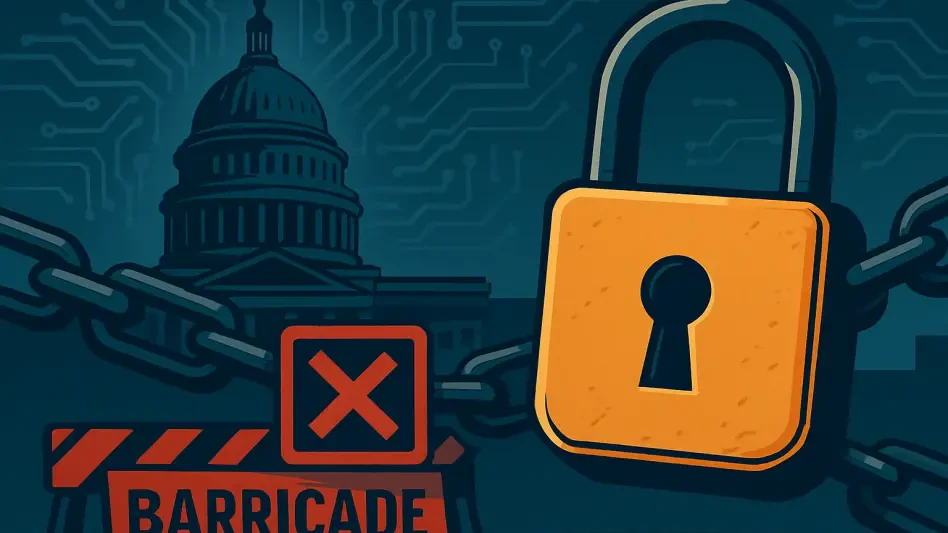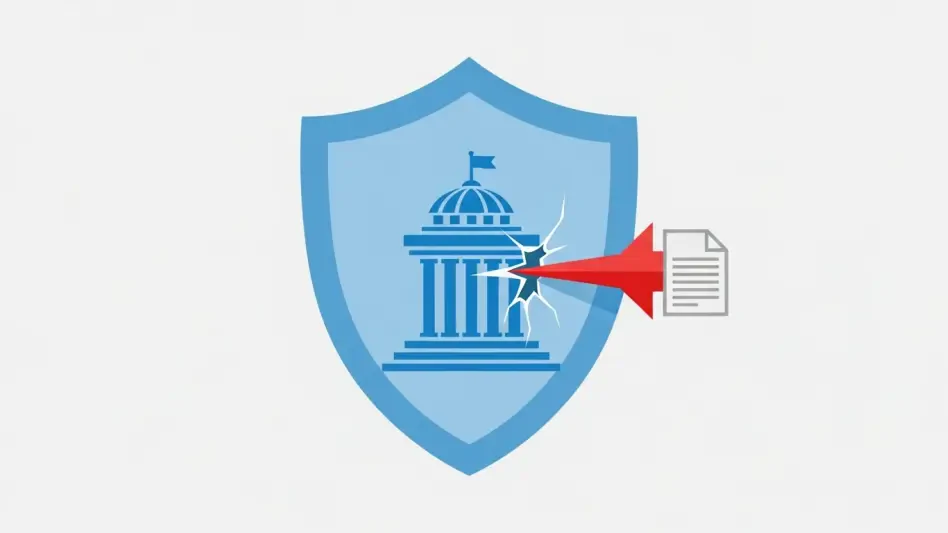In a startling turn of events, the recent U.S. government shutdown has triggered a profound crisis in national security by causing the expiration of the 2015 Cybersecurity Information Sharing Act (CISA 2015), a cornerstone of the nation’s defense against digital threats. This vital legislation facilitated a seamless exchange of cyber threat intelligence between private enterprises and federal agencies, ensuring that critical information could be shared without the looming fear of legal repercussions. Its lapse amid the shutdown has not only paralyzed routine government functions but also exposed significant vulnerabilities in the country’s ability to fend off sophisticated cyberattacks. As the nation grapples with this unprecedented setback, cybersecurity experts, industry stakeholders, and bipartisan lawmakers are sounding urgent alarms about the potential fallout, highlighting how this legislative gap could embolden foreign adversaries and jeopardize critical infrastructure at a time when digital warfare is escalating.
Undermining a Critical Defense Mechanism
The foundation of CISA 2015 was its ability to bridge the gap between private sector giants and government entities, creating a robust network for sharing cyber threat data. Companies such as AT&T and Verizon relied on this law to disclose sensitive information about potential breaches without risking lawsuits, a framework that proved instrumental in identifying major threats like the Chinese state-sponsored “Salt Typhoon” campaign, which compromised the data of over 1.3 million Americans. The law’s expiration now casts a shadow over such collaborations, as businesses face heightened legal uncertainties. Michael Daniel, president of the Cyber Threat Alliance, has warned that many firms might opt to withhold critical intelligence to avoid potential litigation, a decision that could severely limit the nation’s capacity to detect and neutralize emerging cyber dangers in real time.
Beyond the immediate reluctance of companies to share data, the broader implications of this legislative lapse are deeply concerning for national security. The absence of CISA 2015 disrupts a well-established pipeline of threat intelligence that has historically been vital for preempting attacks on essential systems, including telecommunications and financial networks. Without legal protections, the trust that underpinned public-private partnerships begins to erode, potentially creating fragmented defenses at a time when adversaries are exploiting every possible weakness. This situation underscores a glaring vulnerability: the nation’s cyber resilience hinges on cooperation, and without a renewed or replacement framework, the risk of undetected breaches grows exponentially, threatening both public safety and economic stability.
Straining Federal Cyber Defenses
The government shutdown has delivered a double blow to cybersecurity by not only allowing CISA 2015 to expire but also crippling the operational capacity of the Cybersecurity and Infrastructure Security Agency (CISA). Tasked with orchestrating the nation’s cyber defenses, CISA has been forced to operate with a mere 35% of its workforce due to widespread furloughs, leaving it ill-prepared to address the mounting digital threats. A spokesperson for the agency described the law’s expiration as a “serious blow,” emphasizing that the combination of reduced staffing and the loss of a key legislative tool has significantly hampered their ability to safeguard critical sectors such as energy, transportation, and healthcare from malicious actors seeking to exploit systemic weaknesses.
This diminished capacity at CISA comes at a particularly perilous moment, as the frequency and complexity of cyberattacks continue to escalate. The agency’s role in coordinating responses and disseminating threat intelligence to both federal and private entities is now severely constrained, creating dangerous delays in identifying and mitigating risks. For instance, infrastructure systems that rely on real-time alerts to fortify defenses against intrusions are left exposed, potentially allowing hackers to penetrate deeper into networks before any counteraction can be mounted. The stark reality is that a skeletal workforce cannot adequately protect against the sophisticated tactics of foreign adversaries, raising urgent questions about how long the nation can sustain such a compromised state of readiness without catastrophic consequences.
Escalating Dangers from Foreign Adversaries
The timing of CISA 2015’s expiration could not be more inopportune, as the landscape of cyber threats grows increasingly hostile with state-sponsored attacks targeting both government and private sector assets. The “Salt Typhoon” incident, orchestrated by Chinese hackers, serves as a chilling reminder of how foreign actors exploit vulnerabilities to access sensitive data, often using private infrastructure as a gateway to broader national security breaches. With the legal framework for information sharing now absent, the ability to uncover and counteract such campaigns is gravely impaired, leaving systems open to espionage and disruption at an alarming scale, as adversaries capitalize on the current disarray.
Lawmakers across the political spectrum have expressed profound concern over this heightened vulnerability. Senator Gary Peters (D-Mich.) has cautioned that the loss of this critical legislation undermines one of the nation’s most effective safeguards against digital assaults, while Senator Mike Rounds (R-S.D.) fears that the resulting gap in shared intelligence will provide foreign entities with unprecedented opportunities to strike. This bipartisan alarm highlights a shared recognition that without a mechanism to facilitate rapid data exchange, the U.S. risks falling behind in the global cyber arms race, potentially facing more frequent and devastating attacks on infrastructure that underpins daily life, from power grids to communication networks.
Political Stalemate Worsens the Crisis
Amid the chaos of the government shutdown, political gridlock has emerged as a significant barrier to resolving the cybersecurity crisis, further deepening the nation’s exposure to risk. Despite widespread bipartisan support for extending CISA 2015, progress has been stalled by disagreements over specific provisions, culminating in the cancellation of a crucial markup by Senator Rand Paul (R-Ky.), chair of the Senate Homeland Security Committee. This inaction reflects a troubling inability to prioritize national security over partisan disputes, leaving a vital legislative tool in limbo while cyber threats continue to mount, unchecked by the collaborative defenses that once stood as a bulwark against them.
The ramifications of this political impasse extend beyond the immediate legislative failure, striking at the heart of trust between government and industry partners. The U.S. Chamber of Commerce has voiced frustration over the breakdown, noting that CISA 2015 was instrumental in balancing privacy concerns with security needs, ensuring businesses could share data without fear of regulatory backlash. Without swift resolution, the erosion of this confidence could have lasting effects, discouraging private entities from engaging in future partnerships even if a new law is eventually passed. The longer this deadlock persists, the greater the window of opportunity for malicious actors to exploit, underscoring the urgent need for compromise and action in the face of an escalating digital threat landscape.
Navigating the Path Forward
Reflecting on the crisis, it’s evident that the expiration of CISA 2015 during the government shutdown dealt a significant blow to the nation’s cybersecurity posture. The law had been a linchpin in fostering essential collaboration, enabling the detection of sophisticated threats like “Salt Typhoon” through shared intelligence. Its lapse, coupled with CISA’s diminished workforce, left critical infrastructure exposed at a moment of heightened risk, while political discord prevented a timely response to the unfolding emergency. The consensus among experts and leaders was clear: this gap posed a grave threat to national security.
Looking ahead, restoring a framework for information sharing must be an immediate priority, requiring lawmakers to set aside differences and expedite bipartisan legislation. Strengthening CISA’s resources through emergency funding could help mitigate current limitations, while renewed efforts to rebuild trust with private sector partners are essential. Exploring innovative legal protections to encourage data sharing without compromising privacy could also pave the way for a more resilient defense system, ensuring the nation is better equipped to confront the evolving challenges of cyber warfare in the years ahead.








